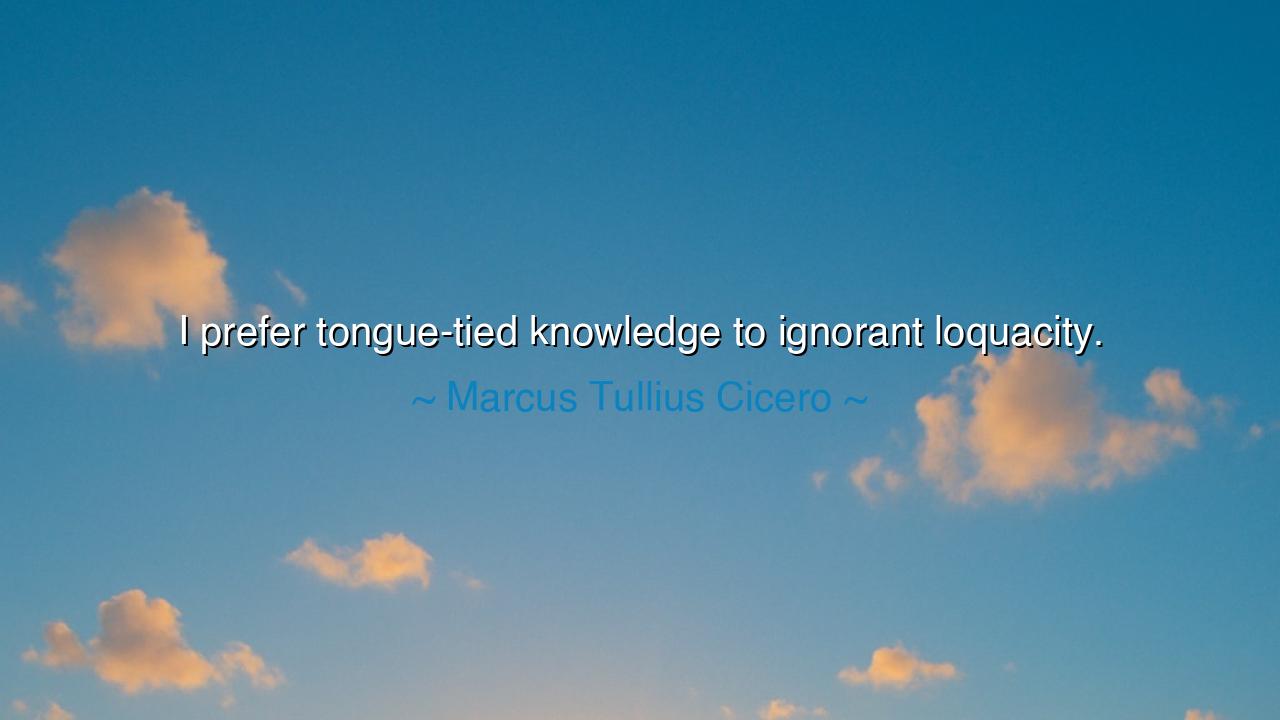
I prefer tongue-tied knowledge to ignorant loquacity.






Hear the voice of Marcus Tullius Cicero, the orator of Rome, who declared: “I prefer tongue-tied knowledge to ignorant loquacity.” In these words burns the wisdom of a man who knew both the power of speech and the folly of its abuse. For Cicero, master of rhetoric and defender of the Republic, understood that silence joined with truth is nobler than endless words bound to ignorance. Better a man who knows and cannot speak, than a man who speaks without knowing. For one holds the seed of wisdom, while the other scatters weeds into the wind.
The meaning of tongue-tied knowledge is humility, the recognition that truth does not always need to roar. There is dignity in restraint, in the man who holds knowledge quietly rather than boasting aloud. His silence may conceal his wisdom, but it does not diminish it. Indeed, it protects him from the vanity of words that outrun understanding. Such a one, though quiet, enriches the world when he acts, when he listens, when he teaches with care.
The meaning of ignorant loquacity is arrogance, the endless babbling of one who knows little yet presumes to know much. Cicero saw such men in the Senate—loud, persuasive, filled with empty words that swayed the masses but led the Republic toward ruin. Their loquacity was poison: eloquence without substance, authority without truth. And he knew well that this vice was more dangerous than silence, for the fool who speaks loudly infects many, while the silent wise man harms none.
History confirms his warning. Consider the trial of Socrates. His accusers filled the air with ignorant loquacity, charging him with corrupting the youth and dishonoring the gods. Their words were smooth, but shallow, and they drowned truth in a sea of noise. Socrates, though far from tongue-tied, embodied Cicero’s principle: he chose careful questioning, humble confession of ignorance, and steady devotion to truth. Though condemned, his wisdom endured while the babbling of his accusers turned to dust.
This teaching also holds for our own lives. Many rush to speak, fearing silence, fearing that others may think them ignorant. Yet Cicero reminds us that silence itself can be wisdom, for it shows restraint and humility. To listen more than to speak is to learn. To pause before answering is to weigh words against truth. Better to speak little with depth than much with emptiness. For the words of the ignorant fall quickly, but the quiet wisdom of the thoughtful endures.
The lesson, then, is clear: cultivate knowledge, and let it guide your tongue. Do not fear silence, for silence can be strength. But guard against ignorant speech, for it harms not only your own soul but also those who hear you. When you must speak, speak with truth, with care, and with purpose. Let your words be few but rich, as gold weighed against the dust of endless chatter.
Therefore, beloved seekers, let your practice be this: choose wisdom over noise, humility over vanity. Be content to be silent if your words do not add to the truth. And when you speak, let it be from knowledge, not from pride. For Cicero’s eternal wisdom remains: better the silence of the wise than the babble of the foolish. Thus you will honor truth, preserve dignity, and give your words the weight of eternity.






AAdministratorAdministrator
Welcome, honored guests. Please leave a comment, we will respond soon